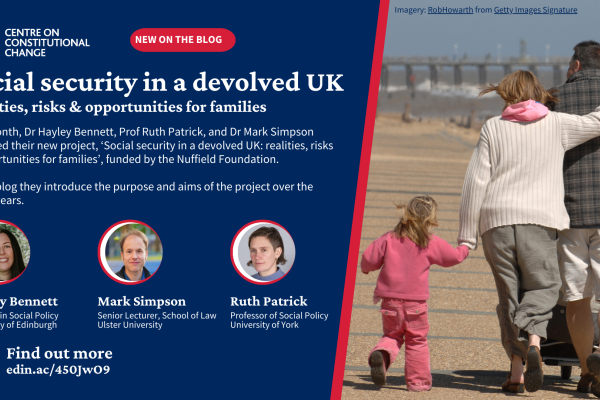By Dr Hayley Bennett, Prof Ruth Patrick and Dr Mark Simpson
This May we launched our new project, Social security in a devolved UK: realities, risks & opportunities for families, funded by the Nuffield Foundation. In this blog we introduce the purpose and aims of the project over the next 2 years.
We spend more on working-age social security than education, or the police and defence combined (Hoynes et al., 2023), and it is the policy instrument most directly able to reduce poverty. The shape and nature of the UK’s social security system has a massive impact on the lives of millions of households, especially those on low and middle incomes, whose living standards have stagnated over recent years. All too often we speak as if there is a single UK social security system, but this has not been the case for some time. Instead, decisions made at Westminster and at the national, regional and local level all intersect to directly affect the social security a family will receive (Simpson, 2022). This leads to growing place-based divergences in the design, generosity and delivery of support. For example, a single parent family living in Birmingham could be hit by the Benefit Cap, but one living in Belfast (Northern Ireland) or Bathgate (Scotland) is protected from this policy because of decisions made by devolved administrations. Despite the scale and nature of these differences, this has never been subject to sustained interrogation. Our new major programme (launched on 1st May 2024) corrects this, and will be the first to comprehensively examine the precise extent of devolution of social security, and to explore what difference this makes to everyday experiences on the ground.
Discussions of UK social security too often fail to acknowledge the extent, nature and significance of devolution[1] in social security policy design, delivery and implementation. This matters as devolution has created significant spatial variations in social security law, policy, and practice. Compared to many EU countries, this multi-level arrangement is relatively new territory for the UK. A great deal has changed in the last decade alone. Scotland and Northern Ireland administrations now deliver near- universal mitigation of selected cuts to benefits. Scotland has also introduced new benefits and Wales is exploring increasing their devolved powers on social security. Local government is now the main provider of crisis support in England, with grants-based provision dominating across devolved nations.
The current knowledge base in this domain is incomplete with significant problems around data quality, and a failure to look at how national, regional and local aspects of difference intersect. Existing research has also tended to focus on policies in isolation rather than taking a more holistic approach – as we do here with our analysis of a key target population: families with children. This is important because devolution also provides an opportunity for policy learning and experimentation. In taking distinctive approaches to social security, national, regional, and local institutions act as laboratories of democracy, enabling an analysis of alternative approaches for addressing long standing societal challenges. But a ‘devolve and forget’ approach from Westminster means this opportunity has not been realised (Dunlop, 2019). This programme will start the work of correcting that. If we can learn from different approaches to social security across the UK, we will be better placed to reduce poverty and improve life chances for all families. This research makes this learning possible, and will directly shape key debates about the future of the UK and the role of the social security system in supporting families on a low-income; debates that matter to us all.
As we look across the next decade and beyond, we need to do all we can to improve our social security system, and to better understand the consequences of increased devolution in this domain. We need to make sure that any future increases to devolution are underpinned by robust evidence bases. We also need to learn from place-based differences in social security that already exist so that policy change can be grounded in an understanding of what works, in what contexts, and for whom. Our programme of research responds to and will directly meet these needs, and – by so doing – has scope to improve policymaking and, subsequently, the lives of millions of families across the UK.
[1] We use ‘devolution’ to describe devolution, decentralisation and localisation. We recognise these are distinct processes, but use this as shorthand for the purposes of this short blog.
This paper is drawn from the Social Security in a Devolved UK project. This project has been funded by the Nuffield Foundation, but the views expressed are those of the authors and not necessarily the Foundation. Visit www.nuffieldfoundation.org
The project is a multi-institutional and inter-disciplinary research and policy team, comprised of academics from seven universities across all four UK nations (University of York, University of Edinburgh, Heriot-Watt University, University of Salford, University of Cardiff, Ulster University, Oxford University), and with policy partners, Resolution Foundation and Child Poverty Action Group.

